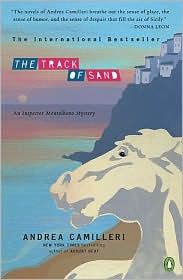rclayton reviewed The track of sand by Andrea Camilleri
The Track of Sand
Montalbano walks out of the house one morning and finds a corpse, this time of a horse. He calls in his colleagues to collect evidence and the municipality to collect the horse, but the horse has disappeared by the time the municipal workers arrive. The horse’s owner seems disproportionally calm over having her horse killed, and doesn’t want to file a report. Montalbano, enraged by the cruelty, runs an informal investigation, discovering stolen horses, including the dead horse, in another jurisdiction, and illegal horse racing. At the same time, he’s menaced by a couple of thugs, who burgle his house, try to burn it down, then burgle it again. Montalbano assumes these are attempts to intimidate him before his appearance as a witness for the prosecution in a trial.
This may be the book in which the series jumps the shark. The plot pivots on Montalbano forgetting he had put …
Montalbano walks out of the house one morning and finds a corpse, this time of a horse. He calls in his colleagues to collect evidence and the municipality to collect the horse, but the horse has disappeared by the time the municipal workers arrive. The horse’s owner seems disproportionally calm over having her horse killed, and doesn’t want to file a report. Montalbano, enraged by the cruelty, runs an informal investigation, discovering stolen horses, including the dead horse, in another jurisdiction, and illegal horse racing. At the same time, he’s menaced by a couple of thugs, who burgle his house, try to burn it down, then burgle it again. Montalbano assumes these are attempts to intimidate him before his appearance as a witness for the prosecution in a trial.
This may be the book in which the series jumps the shark. The plot pivots on Montalbano forgetting he had put a horseshoe in his pants pocket. And by “forgetting” I mean he puts it in his pocket in the morning, carries it around all day, then sends the pants to the cleaners so his housekeeper can return the horseshoe, telling him the cleaners found it in his pocket. And I’m skipping how he got the horseshoe, which seems implausible to me, but I’m not a farrier and don’t know anything about horses, so sure, that’s how it happened. But the whole story, which is complicated, is like that, a stream of “ok, yeah, sure, it could happen like that, ok, sure,” which is wearying to read, particularly when coupled with Camilleri’s elliptical, gnomic writing style.

